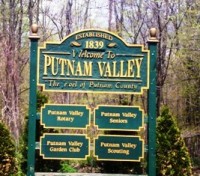Putnam Valley’s Noise Proposal Dubbed ‘Government Overreach’ During Public Hearing
 As Putnam Valley officials strive to find a way to resolve noise issues within the town, a public hearing on a proposal capping sound emissions had residents divided on if the limit would infringe on their personal freedoms.
As Putnam Valley officials strive to find a way to resolve noise issues within the town, a public hearing on a proposal capping sound emissions had residents divided on if the limit would infringe on their personal freedoms.
During a 45-minute public hearing last Wednesday, many residents pressed that the Town Board’s plan to amend the current noise ordinance to include a safe decibel limit on daytime sound is government overreach. Others believe it’s vital to keep peace within certain raucous neighborhoods.
“In my experience and opinion, this law is not about restricting people from having normal time outside,” Mario Digangi said. “It’s about problems that already exist between neighbors and for several years that need this remedy in order to make things right so we can enjoy our property without disturbing or excessive noise.”
Digangi said he has been experiencing issues with his neighbors blaring their music at extremely loud, sustained levels and throwing parties. While nighttime sound can be disruptive, he said daytime disturbances have become a nuisance with so many working from home.
Few residents shared similar experiences and called for changed during the Jan. 20 hearing.
The decision to amend the ordinance comes after the town received numerous complaints of people blasting their music and causing ongoing problems in their neighborhoods over the summer. The existing noise law doesn’t currently address daytime sound and fails to place a penalty on those who violate the law.
Town Supervisor Sam Oliverio has said the absence of a decibel level has restricted law enforcement officers and deputies from effectively enforcing the code.
A decibel is how sound is measured.
The town is proposing that noise levels between 8 a.m. to 6 p.m. within any residentially zoned district shall not exceed 65 decibels, and between 6 p.m. and 8 a.m., noise cannot exceed 55 decibels.
Commercially zoned areas would also be subject to maintaining noise up to 65 decibels, according to the proposal.
Violators would be subject to a fine of up to $500 for each offense, imprisonment of up to 15 days, or both. The town would also be authorized to seek injunctive relief to prevent the continued violation.
While the remainder of the noise ordinance would remain intact, exemptions to the law include emergency alerts, town sponsored events, emergency repairs or maintenance work generated by the town, noise stemming from a permitted event, and generators used during a power outage.
Additionally, the operation of any organ, radio, bell, chimes, or other instruments used in a place of worship would be exempt.
Residents against the proposal argued that the decibel limit is too low or unrealistic for what the town is trying to achieve, pressing that it will only restrict daily activities from being enjoyed by residents and visitors.
“I feel that this proposed law can infringe on our current laws and our current rights,” Margaret Brown said. “We have laws in place that allow us to do those things and this law being so restrictive, I feel very worrisome and it’s government overreach.”
Many in opposition suggested the town narrow the scope of the law to music instead of overall noise.
While the proposal is in line with neighboring municipalities, such as Carmel, board members have previously debated that 65 decibels (dBs) is too law and would restrict homeowners from engaging in common housekeeping activities, like mowing the lawn or cutting down a tree.
For comparison, normal breathing is measured at about 10 dBs, with regular conversation measured up to 65. A vacuum cleaner is categorized at an estimated 70 dBs, general traffic sounds is 80 dBs, and a lawnmower is measured between 85 and 90.
“I believe that having an enforceable noise ordinance is necessary when neighbors don’t want to respect the peace and quiet of other neighbors, but I believe this proposed ordinance is way over broad and would make activities illegal that should in no way be illegal,” Alan Paley said. “I simply don’t see why you can’t draft a law that accomplishes the goal without making our everyday activities illegal.”
Oliverio has said that he’s flexible on increasing the allowable decibels within the town, with officials suggesting numbers ranging between 100 to 110 dBs. While the board did not respond to questions or comments, Oliverio noted that the board might go back and revise the proposal once all comments are considered.
